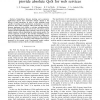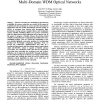35 search results - page 4 / 7 » Improving Quality-of-Control Using Flexible Timing Constrain... |
EMSOFT
2006
Springer
13 years 9 months ago
2006
Springer
Distributed real-time systems require a predictable and verifiable mechanism to control the communication medium. Current real-time communication protocols are typically independe...
CODES
1998
IEEE
13 years 10 months ago
1998
IEEE
Timing analysis for checking satisfaction of constraints is a crucial problem in real-time system design. In some current approaches, the delay of software modules is precalculate...
WIAS
2008
13 years 6 months ago
2008
Our system, based on a multiagent framework called collaborative understanding of distributed knowledge (CUDK), is designed with the overall goal of balancing agents' conceptu...
SBACPAD
2007
IEEE
14 years 10 days ago
2007
IEEE
— Telemedicine, distance learning and e-commerce applications impose time constraints directly related to the efficacy of their operations. In order to offer reliability levels ...
BROADNETS
2006
IEEE
14 years 4 days ago
2006
IEEE
— Advance reservation is a mechanism to guarantee the availability of resources when they are needed. In the context of LambdaGrid, this mechanism is used to provide data-intensi...


